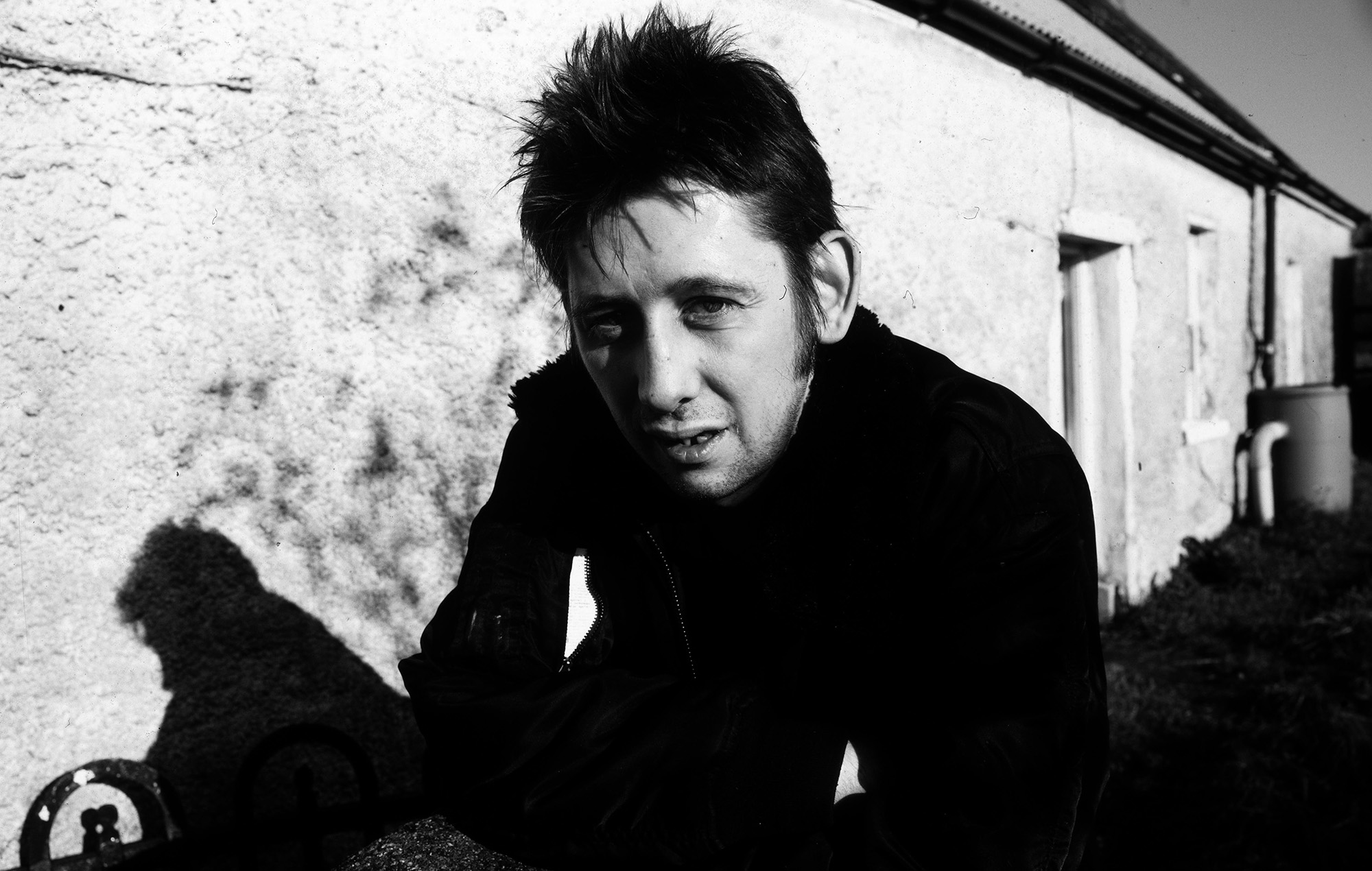In 2004, Shane MacGowan told The Guardian he’d been given six weeks to live, “about 25 years ago”. Those six weeks would last a further two decades, The Pogues frontman’s legend as both Celtic punk icon and relentless carouser growing all the while. For many MacGowan, who died today aged 65 following four months intensive care battling an infection, came to epitomise the romance and revelry of the festive season thanks to The Pogues’ regular Christmas tours and the increasing dominance of ‘Fairytale Of New York’ over the December airwaves (surely now nailed on for the this year’s Christmas Number One). Many more, though, will be toasting him this season for his passionate and rebellious rejuvenation of traditional Irish music, finding a compulsive snarl at the heart of every jig and a belligerent tear in the soul of each ballad.
MacGowan’s reputation as a hard-drinking, hard-drugging punk-about-town – and the tales of him falling out of tour vans, or having a bed always prepared for him at his regular London haunt Filthy McNasty’s are legion – belies the fierce intelligence and rough-lived poetry which made him a songwriting one-off, folk-punk’s Brendan Behan perhaps. It emerged early in life. Born to Irish immigrants in Pembury, Kent, he was raised in Tipperary in Ireland until the age of six but educated back in England, at Holmwood House prep school in Kent and, briefly, at Westminster public school on a scholarship. Having been downing Guinness, by his own estimation, from the age of five, his self-declared “roustabout” activities saw him expelled in his second year for drug possession, but not before he displayed a keen interest in the works of Behan, Hemingway, Wilde and Joyce: he and his father would tackle the ultimate literary challenge Finnegan’s Wake together when MacGowan was just eleven.
Singers Kirsty MacColl (1959 – 2000) and Shane MacGowan with with toy guns and an inflatable Santa in a festive scenario, circa 1987. In 1987, the pair collaborated on the Pogues’ Christmas song ‘Fairytale of New York’. (Photo by Tim Roney/Getty Images)
At 17, Valium addiction led to MacGowan’s first stint in rehab, but he re-emerged straight into the London punk scene. Enamoured with The Sex Pistols and The Clash – and gaining local paper notoriety for having his ear bitten into at a 1976 Clash gig – he formed the Nipple Erectors under the name Shane O’Hooligan and released four rockabilly infused singles before the fire went out in the early 1980s. Part of the Nips’ (as they were known) live act included a raucous take on the folk song ‘Poor Paddy Works On The Railway’, and this concoction of punk vigour and traditional melody was what MacGowan pursued next, first as the short-lived New Republicans and then Pogue Mahone (Irish for “kiss my arse”). When asked about the band’s differences from more traditional acts such as The Dubliners, MacGowan would reply “we play faster and take more speed”.
Signing to Stiff Records following a self-released debut single ‘Dark Streets Of London’, in 1984 Pogue Mahone became The Pogues, and mayhem ensued. Reflecting the manic energy onstage, where tin whistle player Spider Stacy would be beating himself over the head with a beer tray, gigs were riotous and the music righteous, tackling themes of Irish nationalism and history, the experience of the Irish diaspora and the seedy beauty of life in London’s gutters. The Pogues have been credited with helping to dissipate some of the racism aimed at Irish people during the Troubles, and there was a bohemian stylishness inherent in their records: 1984’s debut album ‘Red Roses For Me’ was named after a Sean O’Casey play and included the song ‘The Auld Triangle’ which featured in Behan’s 1954 play The Quare Fellow.
It was 1985’s ‘Rum Sodomy & The Lash’, produced by Elvis Costello, which saw The Pogues rise to cultural and critical acclaim, thanks to tracks such as ‘Dirty Old Town’ and ‘A Pair Of Brown Eyes’. Two 1987 single collaborations then cement their standing: first with The Dubliners on ‘The Irish Rover’ and then with Kirsty MacColl on ‘Fairytale Of New York’, both Number One hits. 1988’s third album ‘If I Should Fall From Grace With God’ became their highest-charting album, boosted by the fiery ‘Fiesta’, but by now MacGowan’s drinking was causing major issues within the band, not least that he was often too drunk to remember the words onstage. Following 1990’s fifth album ‘Hell’s Ditch’ he was sacked from The Pogues for unprofessional behaviour – a sake-drenched scene on a Japanese train is often cited as the final straw – and launched a solo career as Shane MacGowan And The Popes, who released two Americana-tinged albums ‘The Snake’ (1994) and ‘The Crock Of Gold’ (1997) and invited Johnny Depp to play with them on occasion.
Nick Cave And The Bad Seeds performing on stage with Shane MacGowan at Town & Country Club, Kentish Town, London 01 September 1992. (Photo by Ian Dickson/Redferns)
MacGowan’s substance abuse was far from over during this period. He was regularly using LSD as a creative tool, and Sinéad O’Connor famously reported him to the police for snorting heroin in her presence in 1999, which he claims stopped him using the drug. In 2001 The Pogues reformed for regular tours throughout the ensuing decade, with MacGowan signing back up as a full-time member in 2005. According to MacGowan, though, the band “grew to hate each other again” and would release no further new music.
In subsequent years MacGowan would rarely be seen on major stages, playing Dublin clubs with The Shane gang in 2010-11 and appearing as a guest of Babyshambles, the Pretenders or Nick Cave, among others. A fall outside a Dublin studio in 2015 left him wheelchair-bound and, despite having nine-hour dental surgery to fix his famously decayed teeth and quitting alcohol in 2016, poor health would plague him for the rest of his life. In 2018 he was honoured with a concert gala for his 60th birthday, with Bono, Cave, Depp and Irish president Michael D Higgins in attendance; a moving tribute to one of music’s most uncompromising talents who once summed up his philosophy as following “the Irish way of life, the human way of life. Cram as much pleasure into life and rail against the pain you have to suffer as a result.”
The post Shane MacGowan, 1957-2023: an uncompromising, chaotic one of a kind appeared first on NME.




